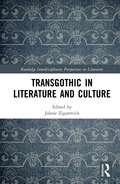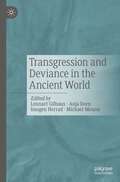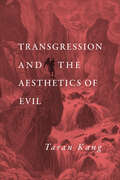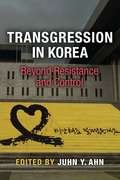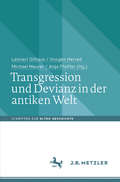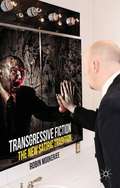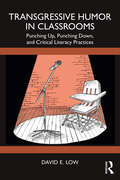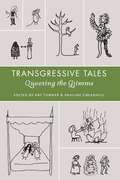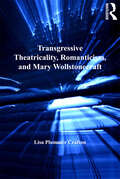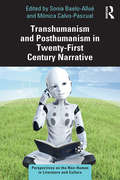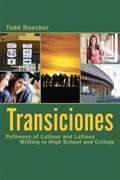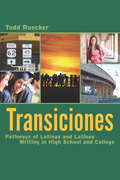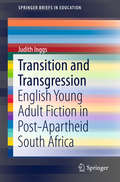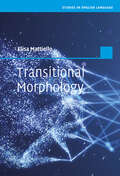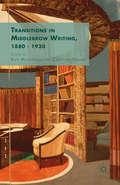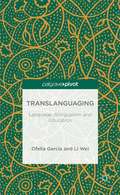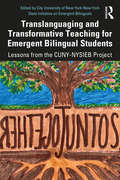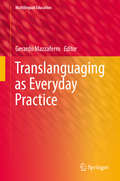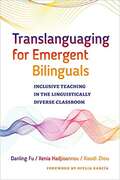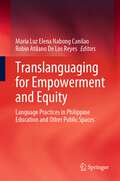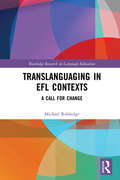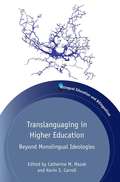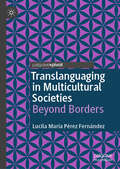- Table View
- List View
TransGothic in Literature and Culture (Routledge Interdisciplinary Perspectives on Literature)
by Jolene ZigarovichThis book contributes to an emerging field of study and provides new perspectives on the ways in which Gothic literature, visual media, and other cultural forms explicitly engage gender, sexuality, form, and genre. The collection is a forum in which the ideas of several well-respected critics converge, producing a breadth of knowledge and a diversity of subject areas and methodologies. It is concerned with several questions, including: How can we discuss Gothic as a genre that crosses over boundaries constructed by a culture to define and contain gender and sexuality? How do transgender bodies specifically mark or disrupt this boundary crossing? In what ways does the Gothic open up a plural narrative space for transgenre explorations, encounters, and experimentation? With this, the volume’s chapters explore expected categories such as transgenders, transbodies, and transembodiments, but also broader concepts that move through and beyond the limits of gender identity and sexuality, such as transhistories, transpolitics, transmodalities, and transgenres. Illuminating such areas as the appropriation of the trans body in Gothic literature and film, the function of trans rhetorics in memoir, textual markers of transgenderism, and the Gothic’s transgeneric qualities, the chapters offer innovative, but not limited, ways to interpret the Gothic. In addition, the book intersects with but also troubles non-trans feminist and queer readings of the Gothic. Together, these diverse approaches engage the Gothic as a definitively trans subject, and offer new and exciting connections and insights into Gothic, Media, Film, Narrative, and Gender and Sexuality Studies.
Transgression and Deviance in the Ancient World
by Lennart Gilhaus Anja Dorn Imogen Herrad Michael MeurerSocial coexistence is made possible and regulated by norms. Which actions are labeled and sanctioned as transgressions of norms is the result of social negotiation processes. Transgression and norm deviance can both stabilize and undermine the existing norm system. The contributions to this anthology aim to provide some impulses on the relationship between norm and deviance in ancient societies by means of selected case studies from the Greek classical period to the Roman imperial period and to investigate the role of transgressive acts for the dynamics of social systems. In 8 contributions, among others on the cult of Artemis, on the tragedian Agathon, on Cicero, Lucan and Tacitus, the topic is treated in a model-like manner.
Transgression and the Aesthetics of Evil
by Taran KangHow do we perceive evil? How do we represent evil? In Transgression and the Aesthetics of Evil, Taran Kang examines the entanglements of aesthetics and morality. Investigating conceptions and images of evil, Kang identifies a fateful moment of transformation in the eighteenth century that continues to reverberate to the present day. Transgression, once allocated the central place in the constitution of evil, undergoes a startling revaluation in the Enlightenment and its aftermath, one that needs to be understood in relation to emergent ideas in the arts. Taran Kang engages with the writings of Edmund Burke, the Marquis de Sade, Friedrich Nietzsche, and Hannah Arendt, among others, as he questions recent calls to "de-aestheticize" evil and insists on a historically informed appreciation of evil’s aesthetic dimensions. Chapters consider the figure of the "evil genius," the paradoxical appeal of the grotesque and the disgusting, and the moral status of spectators who behold scenes of suffering and acts of transgression. In grappling with these issues, Transgression and the Aesthetics of Evil questions the feasibility and desirability of insulating the moral from the aesthetic.
Transgression in Korea: Beyond Resistance and Control (Perspectives On Contemporary Korea)
by Juhn Young AhnSince the turn of the millennium South Korea has continued to grapple with transgressions that shook the nation to its core. Following the serial killings of Korea’s raincoat killer, the events that led to the dissolution of the United Progressive Party, the criminal negligence of the owner and also the crew members of the sunken Sewol Ferry, as well as the political scandals of 2016, there has been much public debate about morality, transparency, and the law in South Korea. Yet, despite its prevalence in public discourse, transgression in Korea has not received proper scholarly attention. Transgression in Korea challenges the popular conceptions of transgression as resistance to authority, the collapse of morality, and an attempt at self- empowerment. Examples of transgression from premodern, modern, and contemporary Korea are examined side by side to underscore the possibility of reading transgression in more ways than one. These examples are taken from a devotional screen from medieval Korea, trickster tales from the late Choson period, reports about flesheating humans, newspaper articles about same- sex relationships from colonial Korea, and films about extramarital affairs, wayward youths, and a vengeful vigilante. Bringing together specialists from various disciplines such as history, art history, anthropology, premodern literature, religion, and fi lm studies, the context- sensitive readings of transgression provided in this book suggest that transgression and authority can be seen as forming something other than an antagonistic relationship.
Transgression und Devianz in der antiken Welt (Schriften zur Alten Geschichte)
by Lennart Gilhaus Imogen Herrad Michael Meurer Anja PfeifferDurch Normen wird gesellschaftliches Zusammenleben ermöglicht und reguliert. Welche Handlungen als Transgressionen von Normen etikettiert und sanktioniert werden, ist das Resultat sozialer Aushandlungsprozesse. Transgression und Normdevianz können dabei sowohl das bestehende Normsystem stabilisieren als auch unterminieren. Die Beiträge dieses Sammelbandes wollen anhand ausgewählter Fallstudien von der griechischen Klassik bis in die römische Kaiserzeit einige Impulse zum Verhältnis von Norm und Devianz in antiken Gesellschaften liefern und die Rolle von transgressiven Akten für die Dynamik gesellschaftlicher Systeme untersuchen. In 8 Beiträgen u.a. zum Artemiskult, zu dem Tragiker Agathon, zu Cicero, Lucan und Tacitus wird das Thema modellhaft verhandelt.
Transgressions of Reading: Narrative Engagement as Exile and Return
by Robert D. NewmanIt is often claimed that we know ourselves and the world through narratives. In this book, Robert D. Newman portrays narrative engagement as a process grounded in psychoanalytic theory to explain how readers (or listeners or viewers) manage to engage with specific narratives and derive from them a personal experience.Newman describes this psychodrama of narrative engagement as that of exile and return, an experience in which narrative becomes a type of homeland, beckoning and elusive, endlessly defining and disrupting the borders of a reader's identity. Within this paradigm, he considers a fascinating variety of narrative texts: from the Jim Jones episode in Guyana to Freud's repression of personal history in his story of Moses; from a surrealistic collage novel by Max Ernst to the horror films of Alfred Hitchcock; from the works of James Joyce, Ariel Dorfman, Milan Kundera, and D. M. Thomas to the tales of abjection in pornography. Transgressions of Reading is itself an engaging work, as interesting for its provocative readings of particular works as for its theoretical insights. It will appeal to readers from all fields in which narrative plays a crucial role, in the study of film and art, modern and contemporary literature, popular culture, and feminist, psychoanalytic, and reader response theory.
Transgressive Fiction
by Robin MookerjeeOften dismissed as sensationalist, transgressive fiction is a sophisticated movement with roots in Menippean satire and the Rabelaisian carnal folk sensibility praised by Bakhtin. This study, the first of its kind, provides a thorough literary background and analysis of key transgressive authors such as Acker, Amis, Carter, Ellis, and Palahniuk.
Transgressive Humor in Classrooms: Punching Up, Punching Down, and Critical Literacy Practices
by David E. LowIn this innovative book, David E. Low examines the multifaceted role of humor in critical literacy studies. Talking about how teachers and students negotiate understandings of humor and social critique vis-à-vis school-based critical literacy curriculums, the book co-examines teachers’ and students’ understandings of humor and critique in schools.Critical literacy centers discussions on power and social roles but often overlooks how students use transgressive humor as a means to interrogate power. Through examples of classroom interactions and anecdotes, Low analyzes the role of humor in classroom settings to uncover how humor interplays with critical inquiry, sensemaking, and nonsense-making. Articulated across the fields of literacy studies and humor studies, the book uses ethnographic data from three Central California high schools to establish linkages and dissonances between critical literacy education and adolescents’ joking practices. Adopting the dialectic of punching up and punching down as a conceptual framework, the book argues that developing more nuanced understandings of transgressive humor presents educators with opportunities to cultivate deeper critical literacy pedagogies and that doing so is a matter of social justice.Essential for scholars and students in literacy education, this book adds to the scholarship on critical literacy by exploring the subversive power of humor in the classroom.
Transgressive Tales: Queering the Grimms
by Pauline Greenhill Kay TurnerThe stories in the Grimm brothers' Kinder- und Hausmärchen (Children's and Household Tales), first published in 1812 and 1815, have come to define academic and popular understandings of the fairy tale genre. Yet over a period of forty years, the brothers, especially Wilhelm, revised, edited, sanitized, and bowdlerized the tales, publishing the seventh and final edition in 1857 with many of the sexual implications removed. However, the contributors in Transgressive Tales: Queering the Grimms demonstrate that the Grimms and other collectors paid less attention to ridding the tales of non-heterosexual implications and that, in fact, the Grimms' tales are rich with queer possibilities. Editors Kay Turner and Pauline Greenhill introduce the volume with an overview of the tales' literary and interpretive history, surveying their queerness in terms of not just sex, gender and sexuality, but also issues of marginalization, oddity, and not fitting into society. In three thematic sections, contributors then consider a range of tales and their queer themes. In Faux Femininities, essays explore female characters, and their relationships and feminine representation in the tales. Contributors to Revising Rewritings consider queer elements in rewritings of the Grimms' tales, including Angela Carter's The Bloody Chamber, Jeanette Winterson's Twelve Dancing Princesses, and contemporary reinterpretations of both "Snow White" and "Snow White and Rose Red." Contributors in the final section, Queering the Tales, consider queer elements in some of the Grimms' original tales and explore intriguing issues of gender, biology, patriarchy, and transgression. With the variety of unique perspectives in Transgressive Tales, readers will find new appreciation for the lasting power of the fairy-tale genre. Scholars of fairy-tale studies and gender and sexuality studies will enjoy this thought-provoking volume.
Transgressive Theatricality, Romanticism, and Mary Wollstonecraft
by Lisa Plummer CraftonThroughout her works, Mary Wollstonecraft interrogates and represents the connected network of theater, culture, and self-representation, in what Lisa Plummer Crafton argues is a conscious appropriation of theater in its literal, cultural, and figurative dimensions. Situating Wollstonecraft within early Romantic debates about theatricality, she explores Wollstonecraft's appropriation of, immersion in, and contributions to these debates within the contexts of philosophical arguments about the utility of theater and spectacle; the political discourse of the French Revolution; juridical transcripts of treason and civil divorce trials; and the spectacle of the female actress in performance, as typified by Sarah Siddons and her compelling connections to Wollstonecraft on and off stage. As she considers Wollstonecraft's contributions to competing notions of the theatrical, from the writer's earliest literary reviews and translations through her histories, correspondence, nonfiction, and novels, Crafton traces the trajectory of Wollstonecraft's conscious appropriation of the trope and her emphasis on theatricality's transgressive potential for self-invention. Crafton's book, the first wide-ranging study of theatricality in the works of Wollstonecraft, is an important contribution to current reconsiderations of the earlier received wisdom about Romantic anti-theatricality, to historicist revisions of the performance and theory of Sarah Siddons, and to theories of spectacle and gender.
Transhumanism and Posthumanism in Twenty-First Century Narrative (Perspectives on the Non-Human in Literature and Culture)
by Sonia Baelo-AlluéTranshumanism and Posthumanism in Twenty-First Century Narrative brings together fifteen scholars from five different countries to explore the different ways in which the posthuman has been addressed in contemporary culture and more specifically in key narratives, written in the second decade of the 21st century, by Dave Eggers, William Gibson, John Shirley, Tom McCarthy, Jeff Vandermeer, Don DeLillo, Margaret Atwood, Cixin Liu and Helen Marshall. Some of these works engage in the premises and perils of transhumanism, while others explore the qualities of the (post)human in a variety of dystopian futures marked by the planetary influence of human action. From a critical posthumanist perspective that questions anthropocentrism, human exceptionalism and the centrality of the ‘human’ subject in the era of the Anthropocene, the scholars in this collection analyse the aesthetic choices these authors make to depict the posthuman and its aftereffects.
Transiciones
by Todd RueckerTransiciones is a thorough ethnography of seven Latino students in transition between high school and community college or university. Data gathered over two years of interviews with the students, their high school English teachers, and their writing teachers and administrators at postsecondary institutions reveal a rich picture of the conflicted experience of these students as they attempted to balance the demands of schooling with a variety of personal responsibilities.Todd Ruecker explores the disconnect between students' writing experiences in high school and higher education and examines the integral role that writing plays in college. Considering the almost universal requirement that students take a writing class in their critical first year of college, he contends that it is essential for composition researchers and teachers to gain a fuller understanding of the role they play in supporting and hindering Latina and Latino students' transition to college.Arguing for situating writing programs in larger discussions of high school / college alignment, student engagement, and retention, Transiciones raises the profile of what writing programs can do, while calling composition teachers, administrators, and scholars to engage in more collaboration across the institution, across institutions, and across disciplines to make the transition from high school to college writing more successful for this important group of students.
Transiciones: Pathways of Latinas and Latinos Writing in High School and College
by Todd RueckerTransiciones is a thorough ethnography of seven Latino students in transition between high school and community college or university. Data gathered over two years of interviews with the students, their high school English teachers, and their writing teachers and administrators at postsecondary institutions reveal a rich picture of the conflicted experience of these students as they attempted to balance the demands of schooling with a variety of personal responsibilities. Todd Ruecker explores the disconnect between students’ writing experiences in high school and higher education and examines the integral role that writing plays in college. Considering the almost universal requirement that students take a writing class in their critical first year of college, he contends that it is essential for composition researchers and teachers to gain a fuller understanding of the role they play in supporting and hindering Latina and Latino students’ transition to college. Arguing for situating writing programs in larger discussions of high school/college alignment, student engagement, and retention, Transiciones raises the profile of what writing programs can do while calling composition teachers, administrators, and scholars to engage in more collaboration across the institution, across institutions, and across disciplines to make the transition from high school to college writing more successful for this important group of students.
Transition and Transgression
by Judith InggsThis book conveys the story of a society in the throes of restructuring itself and struggling to find a new identity. A particularly attractive aspect of this study is the focus on young adult literature and its place in post-apartheid South Africa, as well as its potential use in the classroom and lecture hall. Intersecting these two topics provides a compelling lens for refocusing debate on young adult fiction while offering a new and novel angle on debates in South Africa after the end of apartheid. The multilingual and multicultural South African society has resulted in fiction that differs from other parts of the English-speaking world. This work presents a holistic critique of South African young adult fiction and addresses issues such as change and transformation, identity politics, sexuality, and the issue of the right of white writers to represent and "write" characters of different races.
Transitional Morphology: Combining Forms in Modern English (Studies in English Language)
by Elisa MattielloCombining Forms (CFs) are a major morphological phenomenon in Modern English, yet while they have been discussed in some morphological literature, no full-length study has been devoted to this topic so far. This pioneering book addresses that gap by providing a framework in which CFs are marked as distinct from their neighbouring categories such as abbreviations and blending. It splits CFs into four distinct categories – neoclassical (e.g. bio-therapy, zoo-logy), abbreviated (e.g. e-reader, econo-politics), secreted (e.g. oil-gate, computer-holic) and splinters (e.g. docu- from documentary in docudrama). It shows that the notion of CF spans a wide spectrum of processes, from regular composition to abbreviation, from blending to analogy, and schema. Modern and emerging English CFs are analysed by adopting a corpus-based approach, and measuring their realised, expanding, and potential productivity. Comprehensive yet accessible, it is essential reading for researchers and advanced students of morphology, English historical linguistics, corpus linguistics, and lexicography.
Transitions in Middlebrow Writing, 1880–1930
by Kate Macdonald Christoph SingerThis book examines the connections evident between the simultaneous emergence of British modernism and middlebrow literary culture from 1880 to the 1930s. The essays illustrate the mutual influences of modernist and middlebrow authors, critics, publishers and magazines.
The Transitive Vampire: A Handbook of Grammar for the Innocent, the Eager and the Doomed
by Karen Elizabeth GordonEverything you ever wanted to know about grammar using humorous examples.
Translanguaging: Language, Bilingualism and Education
by Ofelia García Li WeiThis book addresses how the new linguistic concept of 'Translanguaging' has contributed to our understandings of language, bilingualism and education, with potential to transform not only semiotic systems and speaker subjectivities, but also social structures.
Translanguaging and Transformative Teaching for Emergent Bilingual Students: Lessons from the CUNY-NYSIEB Project
by Ofelia GarcíaA critical and accessible text, this book provides a foundation for translanguaging theory and practice with educating emergent bilingual students. The product of the internationally renowned and trailblazing City University of New York-New York State Initiative on Emergent Bilinguals (CUNY-NYSIEB), this book draws on a common vision of translanguaging to present different perspectives of its practice and outcomes in real schools. It tells the story of the collaborative project’s positive impact on instruction and assessment in different contexts, and explores the potential for transformation in teacher education. Acknowledging oppressive traditions and obstacles facing language minoritized students, this book provides a pathway for combatting racism, monolingualism, classism and colonialism in the classroom and offers narratives, strategies and pedagogical practices to liberate and engage emergent bilingual students. This book is an essential text for all teacher educators, researchers, scholars, and students in TESOL and bilingual education, as well as educators working with language minoritized students.
Translanguaging as Everyday Practice (Multilingual Education #28)
by Gerardo MazzaferroThis volume offers empirically grounded perspectives on translanguaging as a locally situated, interactional accomplishment of practical action, and its significance within different domains of social life-school, education, diasporic families and communities, workplaces, urban linguistic landscapes, advertising practices and mental health centres – focusing on case studies from different countries and continents. The 14 chapters contribute to the understanding of translanguaging as a communicative and discursive practice, which is relationally constructed and strategically deployed by individuals during everyday encounters with language and cultural diversity. The contributions testify to translanguaging as an interdisciplinary and critical research paradigm by assembling scholars working on translanguaging from different perspectives, and a wide range of social, cultural, and geographical contexts. This volume contributes to the further development of new theoretical and analytical tools for the investigation of translanguaging as everyday practice, and how and why language practices are constructed, negotiated, opposed or subverted by social actors.
Translanguaging for Emergent Bilinguals: Inclusive Teaching in the Linguistically Diverse Classroom
by Danling Fu Xenia Hadjioannou Xiaodi Zhou Ofelia García Celia Genishi Donna E. AlvermannTranslanguaging for Emergent Bilinguals is a thorough examination of the development, evolution, and current realities of educating emergent bilinguals in U.S. classrooms. <p><p> Through engaging vignettes, readers follow the experiences of emergent bilinguals in a variety of monolingual settings, tracing the challenges encountered by both the students and the schools that serve them. The authors argue that the future of emergent bilingual education lies in an inclusive translanguaging pedagogy. By embracing home languages and cultures, this approach nurtures the development of multiple literacies, enabling individuals to thrive academically, socially, linguistically, and intellectually. <p><p> The text begins by showing how the authors evolved from monolingual language educators to translanguaging educators and ends with concrete takeaways for successfully using this approach in different education settings.
Translanguaging for Empowerment and Equity: Language Practices in Philippine Education and Other Public Spaces
by Maria Luz Elena Nabong Canilao Robin Atilano De Los ReyesThis book investigates how translanguaging is employed for pedagogical purposes and describes how speakers use translanguaging in specific multilingual contexts. It examines the beliefs and perceptions that shape translanguaging in different public spaces and interrogates the notion of translanguaging through the lens of various Philippine public spaces. This book also focuses on the breakthroughs that may be achieved through translanguaging in the academic field and other domains. It presents studies conducted in the Philippines, a multilingual and post-colonial setting where many multilingual speakers engage in translanguaging practices while recognizing the significance of each language in their communication repertoire in expressing their ideas and identities. It provides insights and knowledge on the current language practices in basic and tertiary education and offers more information about the crucial role of translanguaging in the government, media, and church domains in the Philippines. While this book mainly covers the use of translanguaging in various domains in the Philippines, it remains relevant to other multilingual societies around the world. Being a highly multilingual society, the Philippines serves as a global case study for understanding multilingualism. This book demonstrates how blocks to translanguaging may be overcome and explores possibilities that may be considered in introducing it as an effective pedagogical and communication tool. It emphasizes the importance of recognizing the translingual paradigm as a strong force that has been adopted by multilingual language users to promote empowerment and equity.
Translanguaging in EFL Contexts: A Call for Change (Routledge Research in Language Education)
by Michael RabbidgeThe purpose of this book is to promote the value of translanguaging in EFL teaching contexts. To date, translanguaging has been discussed mostly in regards to US and European contexts. This book will examine the teaching beliefs and practices of teachers within a South Korean elementary school context to evaluate the practices of current teachers who use translanguaging strategies when teaching. This examination utilizes sociological theories of pedagogic discourse to discuss the consequences of language exclusion policies on the peninsula. Using these theories, it presents an argument for why EFL contexts like South Korea need to reevaluate their current policies and understandings of language learning and teaching. By embracing translanguaging as an approach, the author argues, they will transform their traditional notions of language learning and teaching in order to view teachers as bilinguals, and learners as emerging bilinguals, rather than use terms of deficiency that have traditionally been in place for such contexts. This book's unique use of sociological theories of pedagogic discourse supports a need to promote the translanguaging ideology of language teaching and learning.
Translanguaging in Higher Education: Beyond Monolingual Ideologies
by Catherine M. Mazak Kevin S. CarrollThis book examines translanguaging in higher education and provides clear examples of what translanguaging looks like in practice in particular contexts around the world. While higher education has historically been seen as a monolingual space, the case studies from the international contexts included in this collection show us that institutions of higher education are often translingual spaces that reflect the multilingual environments in which they exist. Chapters demonstrate how the use of translanguaging practices within the context of global higher education, where English plays an increasingly important role, allows students and professors to build on their linguistic repertoires to more efficiently and effectively learn content. The documentation of such practices within the context of higher education will further legitimatize translanguaging practices and may lead to their increased use not only in higher education but also in both primary and secondary schools.
Translanguaging in Multicultural Societies: Beyond Borders
by Lucila María Pérez FernándezThis book delves into the multifaceted concept of translanguaging, offering a comprehensive examination from its foundational theories to its practical applications. The author provides a nuanced understanding of translanguaging, differentiating it from code-switching and elucidating its core premises, then explores translanguaging practices in early multilingual societies, colonial contexts, and postcolonial and globalized settings. Theoretical foundations are thoroughly explored in the second part of the book, covering sociolinguistic theories and their application to translanguaging, cognitive approaches emphasizing metacognition and cognitive flexibility, psycholinguistic perspectives, and sociocultural theories aligning with translanguaging. Part III examines practical aspects of translanguaging, focusing on its implementation in multilingual classrooms, multicultural communities, and professional settings. The book demonstrates translanguaging's role in community development, cultural heritage preservation, and fostering social cohesion through case studies in diverse contexts, including business, healthcare, and legal settings. Strategies and best practices for integrating translanguaging into language teaching are discussed, along with its benefits and challenges in education. The final section, Part IV, anticipates future directions for translanguaging, exploring emerging technologies such as virtual reality, augmented reality, artificial intelligence, and machine learning. The book also examines translanguaging's potential in linguistic preservation, particularly in the context of indigenous languages, as well as its role in achieving Sustainable Development Goals, including multilingual education and reducing linguistic inequalities. This book will be of interest to researchers, scholars, and educators interested in language studies, sociolinguistics, education, and interdisciplinary fields.
